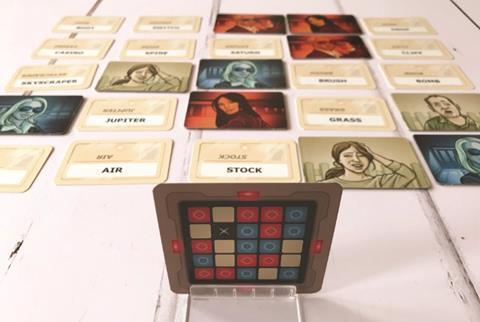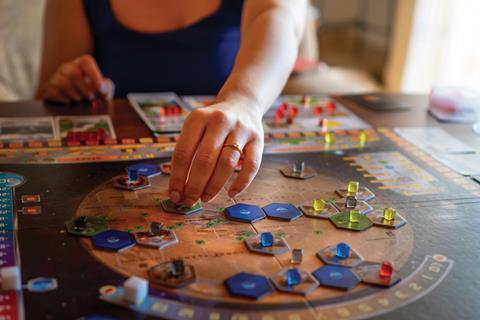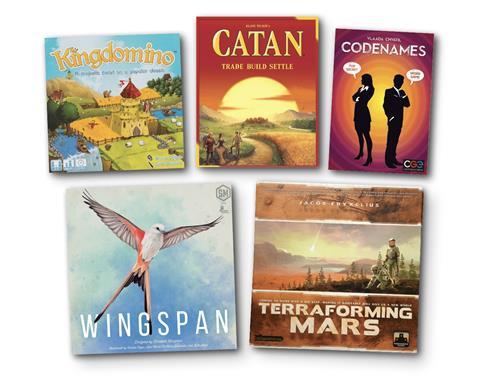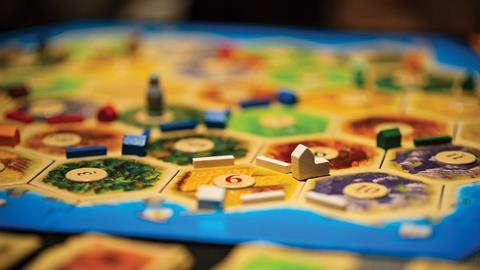Interest in tabletop games is booming. They’re no longer confined to the festive season, says Chris Sinkinson
Have you built a railway across Europe? Eradicated a global pandemic? Constructed a mechanised steam-powered tank? Or amassed a collection of birds from around the globe and settled them in your own little patch of parkland? If you have, you’ve probably joined the growing number of people who are rediscovering the simple joy of tabletop games. Even in an age of streaming, consoles and mobile game apps, there’s been a revival in the popularity of good old-fashioned counters, dice and cards.
Tabletop gaming is a big growth industry with a global market value exceeding $14bn. Even before the 2020 pandemic, the industry was booming, estimated to be growing by nine per cent annually. More than 3,000 new board games are released each year, including many of the highest-funded products on crowdfunding sites such as Kickstarter. These include the card game Exploding Kittens, which raised more than $8m from 219,382 backers and the board game, Kingdom Death Monster 1.5, which raised more than $12m from 19,264 backers.
As far back as 2016, The Guardian published a piece on “the rise and rise of tabletop gaming”, reporting “a boom” in the sales of board games. The trend has only gathered pace since then with board game cafés appearing in many of our towns, cities and university campuses.
Christians are both playing and creating these games. A pastor from Australia was behind the globally popular card game, Sushi Go! A vicar in Norwich, Canon Edward Carter, successfully crowdfunded a wildlife conservation game, Serengeti Sanctuary, reaching the final of Ravensburger’s ‘Next big family game’ competition. Increasingly, there are Christian board gaming groups meeting in churches. Spring Harvest even holds an annual board game week in France (see springharvestholidays.com/feature-weeks/board-games-holiday).
But games have not always been welcome in the Christian community. Some have been wary of games of chance and the association of card games with gambling. In the 1980s, the popularity of Dungeons and Dragons caused panic among many Christian parents who saw the themes of the game as a gateway to the occult. However, such reactions often arise out of ignorance from well-meaning people who are simply not interested in playing games.
But for those who do enjoy them, what are some of the benefits and hazards of such pursuits? With an increasing share of people’s time, money and passion being spent on table top games, these questions are worth reflecting upon. Here are some theological themes to consider.

The theology of imagination
The Church has a long history of creativity and being a healthy place for encouraging the imagination. Evangelicals can look back to the great works of John Milton’s Paradise Lost (Penguin Classics) and John Bunyan’s The Pilgrim’s Progress (Collins). More recently, CS Lewis’ The Chronicles of Narnia (HarperCollins) and JRR Tolkien’s The Lord of the Rings (HarperCollins) have become mainstays of Christian reading.
While some board games – such as Draughts – are simply abstract puzzles, others, such as Settlers of Catan, create beautifully imagined worlds that capture our imagination. This imagination is an important element of what makes us human. We are created in the image of God, capable of what Tolkien called “sub-creation”. We don’t create out of nothing but, using what God has given us, we can recreate or reimagine the world around us.
Board games ask: ‘What if?’ questions. They create scenarios in which we can explore an alternative history or briefly take on the role of a different person. The imagination can be stretched by limitless possibilities. Twilight Struggle allows two players to enter the history of the Cold War and reconsider the relationship between the Americans and Russians. In Everdell, players build a woodland realm for animals who have roles as teachers, engineers and bankers.
The Church has a long history of creativity and being a healthy place for encouraging the imagination
These ‘What if?’ scenarios create a space where, for a moment in time, we can reflect on the significance of decisions and the consequences of our choices. In large, expansive games like Scythe and Gloomhaven players make choices that have moral implications. We do this all the time when we daydream (What if I had been a doctor? What if I bought a Mazda MX-5?) but a game imposes constraints on our choices and helps us think about the knock-on effects of those decisions.
Sometimes our imagination takes us to more dubious places, and this is where Christians may not always share the same level of comfort with certain themes. There are games that involve adult humour or deliberate offensiveness. Other games involve themes that include witches, curses or violence. When considering the value of a game or the sensibilities of those we play with, we can reflect on Paul’s advice to the church in Corinth: “‘I have the right to do anything,’ you say – but not everything is beneficial. ‘I have the right to do anything’ – but not everything is constructive” (1 Corinthians 10:23).
Deception and deceit
Many games involve some form of deception or role play. Does this mean that Christians playing such games are guilty of lying? Not at all – in fact, quite the opposite. Even games of deception involve a high degree of trust and honesty. Everyone who plays these games knows how important it is to play by the rules. Some of the more complex games come with epic rulebooks that are often consulted, sometimes fruitlessly, during gameplay. The deception involved only works if it is in keeping with the rules of the game as a whole. No one wants to play with a cheat – it robs the entire game of significance. There is little worse than spending hours on a game only to realise the winner had been breaking a key rule, even if by mistake.
There are some games that are more overtly Bible-themed or explicitly set out to teach Bible truths. Ironically, they are often the least appealing games to play. When Sushi Go! creator and pastor Phil Walker-Harding was asked whether he would produce an explicitly Christian game, he answered: “You can’t think of art as a tool. How can I…force this concept into a painting or a song or a game? That’s generally not how you come up with good art…the idea that unless we are singing about a Bible story or playing a game about a Bible story that somehow we’re not engaged with God – I think that misses what it means to be a human.” The good use of our imagination to create and play games fulfils part of what it means to be made in the image of God. It does not need a superficial coating of Bible imagery.
However, sometimes a good Bible-themed game comes along, such as Bible Taboo. Following the tried and tested format of Taboo (try guessing a word when the hints cannot include anything obvious), this game introduces lots of Bible names, events and concepts. It is a simple, party-style game that reinforces biblical knowledge without feeling educational.

The theology of leisure
The Protestant work ethic encourages hard work. Aren’t board games a bit of a waste of time, therefore? Don’t be deceived by the estimated length of game time that now appears on boxes. You can easily double that in most instances. And if you get a simple, quick card game you enjoy, expect to want to play it repeatedly. Tabletop gaming is time-consuming.
Humans were made for more than work. Throughout history, play, sport and entertainment have been part of our culture. The need for Sabbath rest is written into God’s law, not only as time for worship but also time out for relaxation and connection with other people. Games can be quick, fun and simple – from Uno to Throw the Burrito, it’s hard to play a game without plenty of good-hearted banter and laughter.
Games create a context in which it can be natural to exchange ideas regarding faith and belief
Few people want to be taught maths or history by playing an ‘educational’ game but, inadvertently, some do create teachable moments. We learn empathy as we see things from a different perspective. We have to make moral choices and perhaps stop and discuss a dilemma. The conversation can easily flow from a choice in a game to a choice we are facing in real life.
Time is precious and not to be wasted, but we need to evaluate what we consider a waste of time. Time is not wasted when we spend it in company with others, being creative, telling stories and sharing ideas. Playing football, reading a book or listening to music are not wasting time, and neither is playing games.
Get gaming!

Board games have come a long way since Monopoly (a game that has caused multiple family arguments and even resulted in murder!). Here are some games that we have found popular in our local group, whether Christian or not, and that give great opportunities for fellowship and witness
Kingdomino: Simple to play but endlessly variable, a game of laying tiles to build a kingdom. Quick and easy, it does not outstay its welcome and is a good way into gaming.
Settlers of Catan: Often described as a gateway game. Once you have played it, you will almost certainly be playing it again.
Codenames: Working as two rival teams, this game requires you to give coded hints to help your teammates guess the words. A great way to get to know new people.
Wingspan: A beautifully produced game based around collecting bird cards and laying eggs. It is competitive; once you understand the rules, it plays very smoothly.
Terraforming Mars: Not for the faint-hearted! This longer strategy game sees players competing for points while sharing the task of raising the oxygen and temperature levels of the Red Planet to make it habitable. It stimulates interesting questions about technology and the future.
The theology of community
Games facilitate fellowship and community. Some are designed to be played solo, but most bring people together to share in a joint experience. Games draw people around a table – something often associated with fellowship in the Bible. Much like a meal, there is a chance to talk, interact, and find a common cause.
For discipleship or evangelism, tabletop gaming offers a relaxed context in which even those who feel awkward in social settings are able to contribute to a conversation. Most games encourage conversation and negotiation. From Settlers of Catan to Twilight Imperium, there are deep games of strategy in which players have to trade or exchange information. This creates a context in which it can be natural to exchange ideas regarding faith and belief. Many games are cooperative, and these particularly lend themselves to fellowship. Rather than competing with each other, everyone has a role and contributes to a common cause. Pandemic is a good example of this kind of game, where everyone shares in the (timely!) task of eradicating a global virus. The game encourages sharing ideas, suggesting alternatives and coming to an agreement.
Many churches now have gaming groups, which are easy to organise and invite non-Christians along to. They provide a non-threatening environment in which anyone can participate without needing to know the habits or jargon of church life.
With the Christmas season upon us, we have a great opportunity to dust off some old board games or invest in some new ones. If your Christmas companions don’t usually play board games, perhaps start by choosing something short and simple. If it’s a new game, read the rules carefully first – or watch one of the numerous how-to-play videos that are now on YouTube. Some people don’t like playing games because they feel embarrassed at not being able to follow the rules. You could have friends double-up and play together as a team. Unlike more passive activities such as watching a film, playing a game can create a great moment for conversation, fellowship and interaction. May God bless us with some good board-gaming experiences this Christmas!







































No comments yet